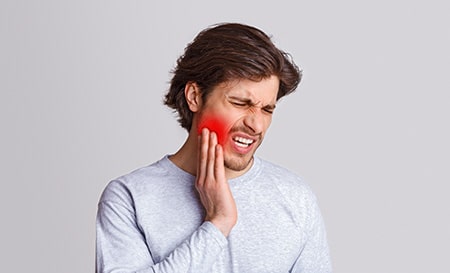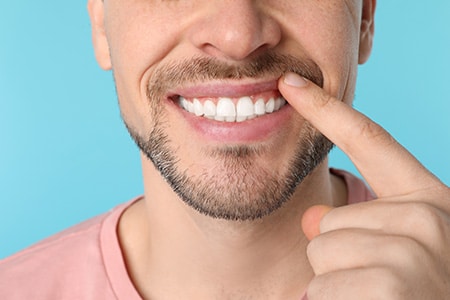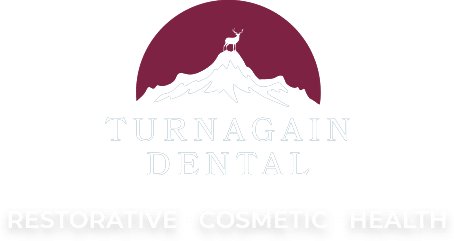At Turnagain Dental we understand sometimes life just happens and some dental needs become more urgent. Whether you have had trauma to a tooth or are experiencing a toothache, our team is here to make your needs a priority.
What is a Dental Emergency?
A dental emergency is any problem in, or around, your mouth that requires immediate attention from a dental professional. Typically, urgent dental care is needed in order to reduce pain, stop bleeding, save and protect a tooth, or avoid future complications. Here is a list of questions to ask yourself to determine if you have an urgent dental need:
- Do you have severe pain in your tooth, gum or jaw?
- Is there bleeding in your mouth so much so that you can’t swallow fast enough or the bleeding isn’t stopping?
- Is there an abnormal amount of swelling in or around your mouth?
- Did your tooth get knocked out or is your tooth loose?
If you answered yes to one or more of these questions, you should contact your dentist to see if they can schedule an urgent appointment to address your concerns.
Dentist VS. Emergency Room
If you are having difficulty breathing or difficulty swallowing, your emergency may be life-threatening and you should go to the emergency room immediately. For urgent dental problems that are not life-threatening, it is best to avoid an unnecessary trip to the emergency room. Instead, call Turnagain Dental for an urgent appointment.
What to do if You have a Dental Emergency
Once you have determined that your dental problem is not life-threatening, take the following steps to temporarily alleviate your symptoms and/or prevent the problem from getting worse:
- Severe pain in your tooth or gums: Swish your mouth with warm saltwater; then apply an ice pack or cold compress to the outside of the mouth in the area of the pain.
- Bleeding that won’t stop: Rinse your mouth with warm saltwater; then apply pressure to the area with a moist gauze.
- Broken or chipped tooth: Swish with warm saltwater. If there is bleeding, apply a moist gauze to the area with light pressure. If there is swelling or pain, use a cold compress on the outside of the mouth.
Call Turnagain Dental. During business hours, one of our team members will take care of you. If it is after hours, follow the instructions on the answering machine.
How to prevent future Dental Emergencies
While not all dental emergencies can be completely avoided, there are steps you can take to reduce the risk of experiencing a dental emergency. Prevention of dental emergencies begins with good oral home care and regular visits to your dentist for routine exams and professional cleanings. In addition, several other steps should be taken in order to minimize your risk of a dental emergency.
- During sports: Protect your teeth with a custom mouth guard from your dentist.
- Working/Hobbies: Avoid using your teeth as tools. Don’t bite your nails. Don’t bite fishing lines. Don’t bite or hold nails or sewing needles between your teeth.
- Hard foods: Avoid chewing on excessively hard foods, like ice, popcorn kernels and hard candy like jawbreakers and peanut brittle.
FAQs
What is urgent dental care?
 Urgent dental care is intended to address serious injuries to the teeth and gums that can lead to permanent damage. If you are experiencing a dental emergency in Anchorage, Dr. Kennedy and the team at Turnagain Dental are here to help save your smile. Certain treatments are time-sensitive; this means if you do not seek out treatment within the recommended timeframe, you can experience permanent tooth loss.
Urgent dental care is intended to address serious injuries to the teeth and gums that can lead to permanent damage. If you are experiencing a dental emergency in Anchorage, Dr. Kennedy and the team at Turnagain Dental are here to help save your smile. Certain treatments are time-sensitive; this means if you do not seek out treatment within the recommended timeframe, you can experience permanent tooth loss.
How can I determine if I need urgent dental care?
Severe pain: If you are experiencing extreme dental pain or toothache, it may be time to seek urgent dental care. While some moderate pain can be common in certain situations, extreme pain is often representative of a serious issue that needs to be addressed right away, such as an abscessed tooth.
Knocked-out tooth: Trauma or injury to the mouth can sometimes result in one or more teeth being knocked out. Once a tooth has been removed from its socket, it must be treated within a certain amount of time to increase the risk of its survival.
Swelling: When the gums or jaw begin swelling unexpectedly, you may have a dental emergency. Swelling can indicate a number of serious issues, such as infections that can lead to tooth loss and extreme pain.
Missing dental restorations: Dental fillings are used to repair damage from cavities, which leave the underlying structure of the tooth exposed. If you discover your dental restoration is missing, urgent dental care is necessary to help restore the vulnerable tooth.
Soft tissue injury: Soft tissue injuries may be considered dental emergencies depending on severity. These injuries can include tongue, cheek, lips, and gums. In these cases, seek urgent dental care immediately and follow all provided instructions for controlling bleeding, if necessary.
My tooth was just knocked out. What should I do?
If your tooth has just been knocked out, seek dental care immediately. A tooth that stays out of its socket for an hour or longer may not be able to be saved. If the tooth has been shattered into more than one piece, locate as many fragments as you can and bring them to your emergency dental appointment.
I have a soft tissue injury. What should I do?
 Injuries to the soft tissues in the mouth can often result in significant bleeding. While seeking urgent dental care, the following steps may help you control bleeding:
Injuries to the soft tissues in the mouth can often result in significant bleeding. While seeking urgent dental care, the following steps may help you control bleeding:
- Use a mild saltwater mixture to rinse the mouth
- Apply consistent pressure to the area that is bleeding using moist gauze.
- Use a cold compress on the outside of the injured area for at least five minutes.
What is not considered a dental emergency?
In many cases, it is easy to distinguish between a dental emergency and a non-emergency. However, this distinction is not always clear. When in doubt, patients can seek guidance from Dr. Kennedy while keeping the following non-emergencies in mind:
- Mild or moderate toothache
- Small crack in the tooth
- Minor injuries to the soft tissue, such as a shallow cut in the inner cheek.
Until you can seek treatment, you may be able to manage symptoms of common dental ailments with warm water rinses and over-the-counter pain relievers.
Despite our best efforts, dental emergencies can still happen. In the event you find yourself with a dental emergency, please call our office immediately. We will do our best to schedule your urgent needs at the earliest possible time, often in the same day.
